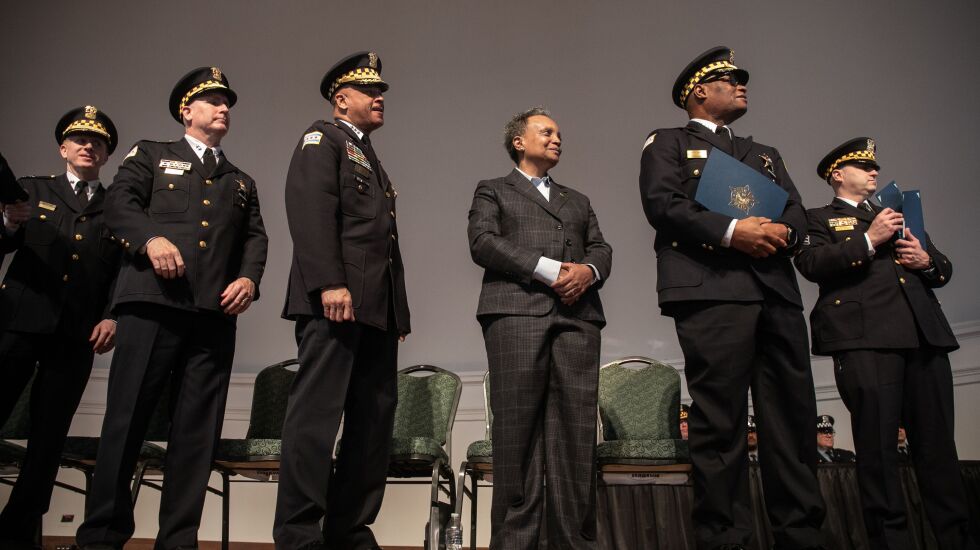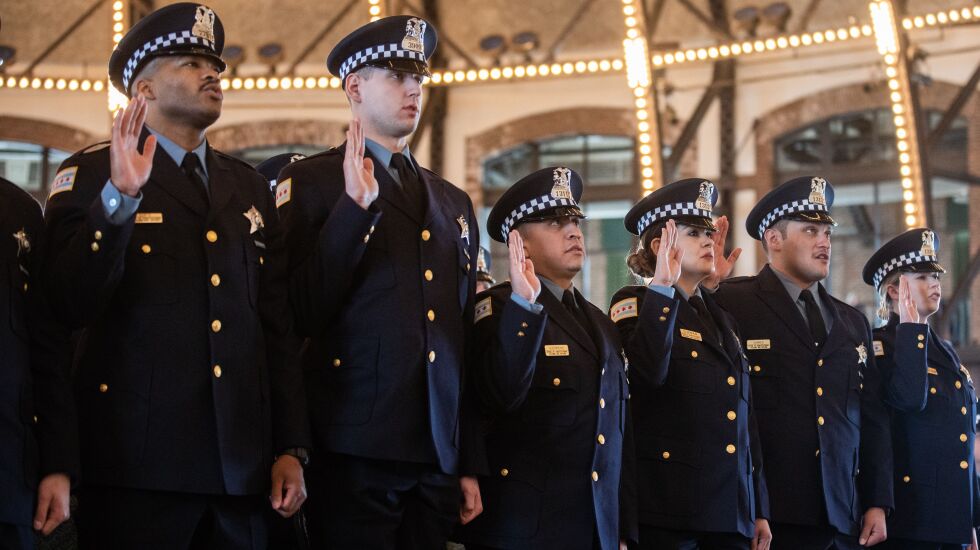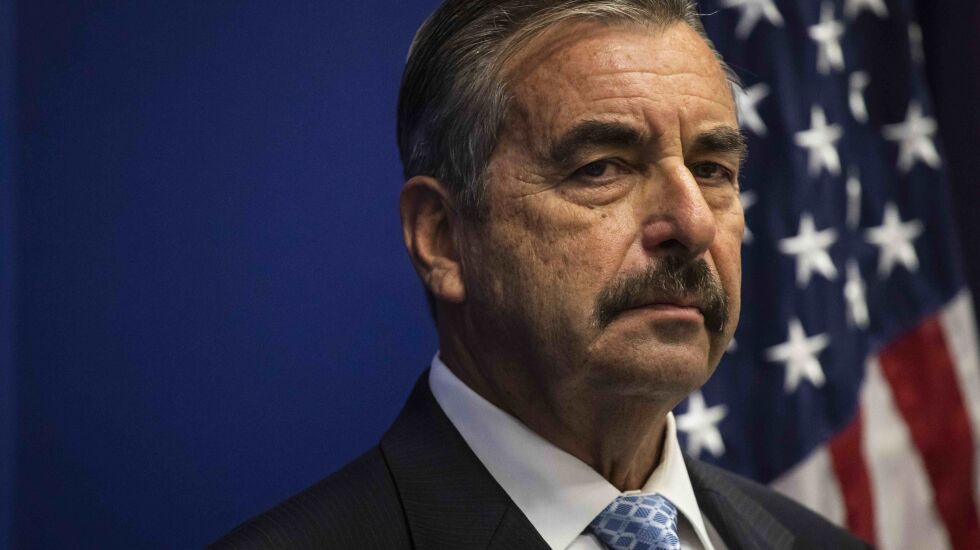Both candidates in Chicago’s mayoral runoff have declared they prefer an insider to replace departing Chicago Police Supt. David Brown.
Promoting from within, they say, will begin restoring rock-bottom morale among the police department’s rank and file.
The problem is, the Chicago Police Department bench is thin after a wave of resignations among top brass during Brown’s tenure.
Highly respected Chief of Detectives Brendan Deenihan was the latest to call it quits. Among those beating him out the door: Chief of Counterterrorism Ernest Cato; Area 5 Deputy Chief Eric Winstrom; Deputy Chief of Special Functions Steve Georgas; and First Deputy Supt. Anthony Riccio.
Bob Boik, who coordinated compliance with a federal court consent decree requiring department reforms, was fired by Brown after raising alarms about staffing cuts to his office that threatened to undermine an already slow march toward police reform.
Those high-level departures under Brown will make it difficult for the new mayor to find an insider who is qualified, battle-tested — and wants the job.
The mayoral contenders — Paul Vallas and Brandon Johnson — agree the tenure of Brown, the retired Dallas police chief lured to Chicago by outgoing Mayor Lori Lightfoot, was a failed experiment.
But the opportunity to fill Brown’s shoes may be even less attractive considering the multiple authorities the superintendent will answer to.
Civilian police review is just beginning, with citizen councils elected Tuesday in all 22 police districts. Those three-person councils will nominate a permanent, seven-member Community Commission for Public Safety and Accountability.
But until then, an interim commission is doing the work, including a nationwide search for Brown’s replacement.
Chairman Anthony Driver is promising the “most transparent and community-driven” search Chicago has ever seen.
The stark contrast between Vallas and Johnson on public safety could make the job even less attractive.
Vallas, pushing a law-and-order message, was endorsed by a Fraternal Order of Police that spent four years at loggerheads with Lightfoot.
He has unveiled a plan to fill 1,700 police vacancies and “take the handcuffs off” demoralized officers.
Johnson now avoids the politically volatile phrase to “defund” the police, but won’t commit to filling those 1,700 vacancies or fully funding the $1.94 billion CPD budget.
The cornerstone of his anti-violence strategy is his tax-the-rich plan to bankroll $1 billion in new spending on public schools, transportation, new housing, health care, mental health and job creation. He said he wants to train and promote 200 new detectives and launch a comprehensive efficiency audit.
Susan Lee, Lightfoot’s former deputy mayor for public safety, said the conflicting messages from Vallas and Johnson avoid “what actually has to happen to fix CPD.”
“It requires a level of expertise about policing in general, but about CPD particularly, that either of them, if they get elected, will have to confront,” Lee said.

Former Inspector General Joe Ferguson — forced out by Lightfoot — said choosing an insider has “important benefits,” especially now, “when morale is so deflated.” Someone who left the department still could apply for the top job, he noted.
Still, the right outsider also could work.
“Charlie Beck was that person. He knew how to relate to the officers, to the press and to the community. You need someone with that capacity if you’re going outside,” Ferguson said, referring to the former Los Angeles police chief who served as interim top cop in Chicago after Lightfoot fired Eddie Johnson.
Lightfoot gave Beck carte blanche to shake things up, and he ordered one of the most sweeping reorganizations in CPD history, putting hundreds of officers and detectives back in neighborhood districts and giving district commanders more control.
But with homicides, shootings and civil unrest surging, Brown reversed field, bolstering large units that could be mobilized across the city.
One citywide unit, the Community Safety Team, was marred by allegations of an illegal quota system and shocked by the shooting that killed Officer Ella French and critically wounded her partner, Carlos Yanez Jr. After that, Brown quietly scaled back some of the citywide units.
Riccio said he’d be willing to take over as interim superintendent but would prefer someone younger as the next permanent superintendent. First Deputy Supt. Eric Carter will serve as interim after Brown’s March 16 departure, and at least until a new mayor is sworn in.
Riccio complained the department “sputtered” with no clear strategy under Brown, who was quick to “demote and demean” members of the command staff, ushering in a wave of resignations.
“When you do that to people ... they tend to get a little fetal, and they’re afraid to do their jobs,” said Riccio, now working for clout-heavy Monterrey Security, along with the CPD’s former third-in-command Fred Waller Jr.
Brown set a goal to bring homicides down to less than 300 per year. Instead, the city ultimately recorded more than double that target each year of his tenure — 776 in 2020, 804 in 2021 and 695 in 2022, according to police records.
“There was no clear strategy to fight crime. There was no clear goal, and a lot of guys just sat back and waited for direction. And the direction never came from the top,” Riccio said.

Former CPD Supt. Garry McCarthy was fired by then-Mayor Rahm Emanuel in the furor following the court-ordered release of the fatal Laquan McDonald shooting video.
McCarthy argued Brown’s three-year tenure in Chicago was a failure because he “got run over by Lori” Lightfoot.
“Lori would hold meetings with commanders in City Hall on Mondays to talk about crime. I would never, ever, ever have accepted that because there’s something called the chain of command,” said McCarthy, now police chief in suburban Willow Springs.
“If the commanders see that the boss is not in charge and the superintendent is not in charge, they’re not gonna listen. They’re not gonna carry out what they need to do,” said McCarthy.
McCarthy also was a top deputy in New York and police chief in Newark, New Jersey.
“I’m not sure inside or outside matters. ... I came from outside in two different places and succeeded in both places,” he said.
Ferguson argued Brown sealed his own fate by arriving in Chicago without a support team.
“David Brown walked into the job kind of like Gary Cooper in ‘High Noon,’ walking down the center of the street all by himself. And what he picked as senior command early on was folks that he was comfortable with, but not folks that sent the right signal to the rank and file. So I think he lost them very, very quickly,” Ferguson said.
Whomever the new mayor chooses, Beck said the agenda should be the same.
“CPD needs to embrace the power of the consent decree — not only the power it has over the department, but the power that it gives the department. You can use it to make sure you have the right equipment. You can use it to make sure that your programs that increase public trust are viable. That’s No. 1,” Beck said.
“No. 2, CPD is too reliant on centralized policing. It needs to hold commanders accountable in the districts and give them the resources to do their jobs. That’s one of the big failures. CPD diffuses the power of its resources among specialized units and needs to push it into the districts.”
Beck also advised the new superintendent to “work on morale” by getting rid of merit promotions that he abolished, only to have Brown restore them.
“Nobody trusts that promotional system, nor should they. ... You have this undefinable, indescribable, unsupportable promotion system, and then you wonder why morale is bad. It’s got to be fixed. ... If you’re fair to your cops, that’s how they treat the public.”








